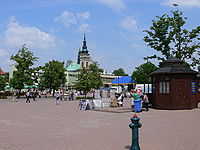Republic of Tarnobrzeg
Republic of Tarnobrzeg Republika Tarnobrzeska | |||||||||
|---|---|---|---|---|---|---|---|---|---|
| 1918–1919 | |||||||||
| Capital | Tarnobrzeg | ||||||||
| Common languages | Polish | ||||||||
| Religion | Roman Catholicism | ||||||||
| Government | Republica | ||||||||
| Historical era | Aftermath of World War I | ||||||||
• Established | 6 November 1918 | ||||||||
• Disestablished | Spring 1919 | ||||||||
| |||||||||
a. Soviet republic intended. | |||||||||

The Republic of Tarnobrzeg (Polish: Republika Tarnobrzeska, IPA: [rɛpuˈblika tarnɔˈbʐɛska]) was a short-lived entity, proclaimed 6 November 1918 in the Polish town of Tarnobrzeg. Its main founders were two socialist activists - Tomasz Dabal and Father Eugeniusz Okon, a Roman Catholic priest.
The idea of the Republic had its roots in mass demonstrations of peasants, which were taking place almost on daily basis in the fall of 1918. Tarnobrzeg had been part of the Austrian Empire (province of Galicia) and dissolution of this entity created a political unrest. On 6 November, after a demonstration with some 30,000 people, local peasants decided to take advantage of it and seize power.
As news of the Russian Revolution came to Tarnobrzeg, the people decided to follow Communist ideas. They demanded liquidation of capitalist government and introduction of a land reform, which would result in taking away land from rich owners and giving it to the poor peasantry. Also, directed by Okon and Dabal, the peasants started to organize local administration as well as a peasants' militia.
The Republic of Tarnobrzeg was suppressed by units of the freshly created Polish Army at the beginning of 1919. Father Okon was arrested but soon released, when the locals elected him to the Polish Parliament.
References
- Template:Pl icon Encyklopedia.interia
- Template:Pl icon Republika Tarnobrzeska
- A demonstration in Tarnobrzeg in early years of the 20th century, probably in 1918

